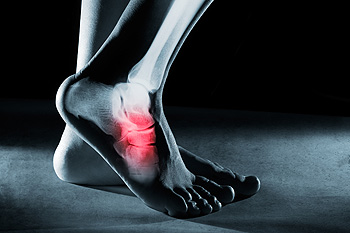Douglas Pacaccio, DPM
Thomas Nordquist, DPM
November 2019
How Do Stress Fractures Happen?
 A stress fracture develops gradually from repetitive motions. This can come from participating in sporting activities that involve running and jumping, or from walking for extended periods of time. The medical condition that is known as osteoporosis may diminish the strength of the bones, and tiny cracks may appear in the feet. Research has indicated this may be prevalent among women as the aging process occurs. Additional reasons why stress fractures can occur may be linked to obesity, improper muscle alignment, or from taking specific medication that may weaken the bones. Effective treatment options can include elevating the foot which may help to reduce any existing swelling, in addition to wrapping the foot to provide adequate support. If you have endured a stress fracture, please speak to a podiatrist as quickly as possible who can determine what the best treatment is for you.
A stress fracture develops gradually from repetitive motions. This can come from participating in sporting activities that involve running and jumping, or from walking for extended periods of time. The medical condition that is known as osteoporosis may diminish the strength of the bones, and tiny cracks may appear in the feet. Research has indicated this may be prevalent among women as the aging process occurs. Additional reasons why stress fractures can occur may be linked to obesity, improper muscle alignment, or from taking specific medication that may weaken the bones. Effective treatment options can include elevating the foot which may help to reduce any existing swelling, in addition to wrapping the foot to provide adequate support. If you have endured a stress fracture, please speak to a podiatrist as quickly as possible who can determine what the best treatment is for you.
Stress fractures occur when there is a tiny crack within a bone. To learn more, contact one of our podiatrists from Advanced Foot and Ankle Surgeons, Inc. . Our doctors can provide the care you need to keep you pain free and on your feet.
How Are They Caused?
Stress fractures are the result of repetitive force being placed on the bone. Since the lower leg and feet often carry most of the body’s weight, stress fractures are likely to occur in these areas. If you rush into a new exercise, you are more likely to develop a stress fracture since you are starting too much, too soon. Pain resulting from stress fractures may go unnoticed at first, however it may start to worsen over time.
Risk Factors
- Gender – They are more commonly found in women compared to men.
- Foot Problems – People with unusual arches in their feet are more likely to develop stress fractures.
- Certain Sports – Dancers, gymnasts, tennis players, runners, and basketball players are more likely to develop stress fractures.
- Lack of Nutrients – A lack of vitamin D and calcium may weaken the bones and make you more prone to stress fractures
- Weak Bones – Osteoporosis can weaken the bones therefore resulting in stress fractures
Stress fractures do not always heal properly, so it is important that you seek help from a podiatrist if you suspect you may have one. Ignoring your stress fracture may cause it to worsen, and you may develop chronic pain as well as additional fractures.
If you have any questions, please feel free to contact one of our offices located in Sycamore, and Yorkville, IL . We offer the newest diagnostic and treatment technologies for all your foot care needs.
Reminder: When Was the Last Time...?
How to Maintain Proper Foot Health When Pregnant
 Swollen feet is a common ailment many pregnant women are familiar with. It typically occurs as a result of pressure that is caused by the fetus, and warmer temperatures may also play a significant role. Many pregnant women who tend to stand for the majority of the day may experience pain, discomfort, and swelling in the feet and ankles. Moderate relief may be found by elevating the feet at the end of the day, wearing shoes that are comfortable, and by regularly drinking plenty of water. Research has indicated that performing gentle stretches may decrease a portion of the swelling. An effective stretch can consist of circulating the ankle several times, followed by changing directions. If you have questions about how to reduce swelling in your feet while being pregnant, please consult with a podiatrist.
Swollen feet is a common ailment many pregnant women are familiar with. It typically occurs as a result of pressure that is caused by the fetus, and warmer temperatures may also play a significant role. Many pregnant women who tend to stand for the majority of the day may experience pain, discomfort, and swelling in the feet and ankles. Moderate relief may be found by elevating the feet at the end of the day, wearing shoes that are comfortable, and by regularly drinking plenty of water. Research has indicated that performing gentle stretches may decrease a portion of the swelling. An effective stretch can consist of circulating the ankle several times, followed by changing directions. If you have questions about how to reduce swelling in your feet while being pregnant, please consult with a podiatrist.
Pregnant women with swollen feet can be treated with a variety of different methods that are readily available. For more information about other cures for swollen feet during pregnancy, consult with one of our podiatrists from Advanced Foot and Ankle Surgeons, Inc. . Our doctors will attend to all of your foot and ankle needs.
What Foot Problems Can Arise During Pregnancy?
One problem that can occur is overpronation, which occurs when the arch of the foot flattens and tends to roll inward. This can cause pain and discomfort in your heels while you’re walking or even just standing up, trying to support your baby.
Another problem is edema, or swelling in the extremities. This often affects the feet during pregnancy but tends to occur in the later stages.
How Can I Keep My Feet Healthy During Pregnancy?
- Wearing orthotics can provide extra support for the feet and help distribute weight evenly
- Minimize the amount of time spent walking barefoot
- Wear shoes with good arch support
- Wear shoes that allow for good circulation to the feet
- Elevate feet if you experience swelling
- Massage your feet
- Get regular, light exercise, such as walking, to promote blood circulation to the feet
If you have any questions please feel free to contact one of our offices located in Sycamore, and Yorkville, IL . We offer the newest diagnostic and treatment technologies for all your foot and ankle needs.
Different Types of Foot Fractures
A foot fracture occurs when one or more bones break slightly or severely. Typical reasons why this type of injury may occur can include falling, having a heavy object land on your foot, or slight cracks may gradually form from standing on a hard surface for most of the day. There are several different types of foot fractures. If the bone should stay in place as it breaks, this is known as a non-displaced fracture. When the bone is fractured in two areas, a displaced break exists. If you have broken your foot in several places, this is referred to as a comminuted fracture. An open fracture exists when the bone is piercing through the skin, and may become infected. There are common symptoms that patients have when they have broken their foot. These can consist of severe pain and discomfort around the affected area, swelling, bruising, and it may be difficult to walk. If you have broken your foot, your podiatrist will perform a proper diagnosis, and can offer treatment solutions.
A broken foot requires immediate medical attention and treatment. If you need your feet checked, contact one of our podiatrists from Advanced Foot and Ankle Surgeons, Inc. . Our doctors can provide the care you need to keep you pain-free and on your feet.
Broken Foot Causes, Symptoms, and Treatment
A broken foot is caused by one of the bones in the foot typically breaking when bended, crushed, or stretched beyond its natural capabilities. Usually the location of the fracture indicates how the break occurred, whether it was through an object, fall, or any other type of injury.
Common Symptoms of Broken Feet:
- Bruising
- Pain
- Redness
- Swelling
- Blue in color
- Numbness
- Cold
- Misshapen
- Cuts
- Deformities
Those that suspect they have a broken foot shoot seek urgent medical attention where a medical professional could diagnose the severity.
Treatment for broken bones varies depending on the cause, severity and location. Some will require the use of splints, casts or crutches while others could even involve surgery to repair the broken bones. Personal care includes the use of ice and keeping the foot stabilized and elevated.
If you have any questions please feel free to contact one of our offices located in Sycamore, and Yorkville, IL . We offer the newest diagnostic and treatment technologies for all your foot and ankle needs.
The Benefits of Strengthening the Ankles
 Research has indicated that the biomechanics of the ankle may be compromised if high heels are frequently worn. They may affect balance and strength, and this can allow falls to occur. If the desire to wear high heels is strong, it may be beneficial to alternate wearing these types of shoes with shoes that have a lower and wider heel. It may help to perform specific stretches while sitting, and this may aid in restoring strength in the ankle. Additionally, the ankle joints may become more stable, which can help to reduce the risk of injury. Heel lifts are an effective stretch for the entire foot. This is done by standing and slowly lifting the heels up and down, and then alternating feet. If you would like additional information about how to strengthen your feet from frequently wearing high heels, please consult with a podiatrist.
Research has indicated that the biomechanics of the ankle may be compromised if high heels are frequently worn. They may affect balance and strength, and this can allow falls to occur. If the desire to wear high heels is strong, it may be beneficial to alternate wearing these types of shoes with shoes that have a lower and wider heel. It may help to perform specific stretches while sitting, and this may aid in restoring strength in the ankle. Additionally, the ankle joints may become more stable, which can help to reduce the risk of injury. Heel lifts are an effective stretch for the entire foot. This is done by standing and slowly lifting the heels up and down, and then alternating feet. If you would like additional information about how to strengthen your feet from frequently wearing high heels, please consult with a podiatrist.
High heels have a history of causing foot and ankle problems. If you have any concerns about your feet or ankles, contact one of our podiatrists from Advanced Foot and Ankle Surgeons, Inc. . Our doctors can provide the care you need to keep you pain-free and on your feet.
Effects of High Heels on the Feet
High heels are popular shoes among women because of their many styles and societal appeal. Despite this, high heels can still cause many health problems if worn too frequently.
Which Parts of My Body Will Be Affected by High Heels?
- Ankle Joints
- Achilles Tendon – May shorten and stiffen with prolonged wear
- Balls of the Feet
- Knees – Heels cause the knees to bend constantly, creating stress on them
- Back – They decrease the spine’s ability to absorb shock, which may lead to back pain. The vertebrae of the lower back may compress.
What Kinds of Foot Problems Can Develop from Wearing High Heels?
- Corns
- Calluses
- Hammertoe
- Bunions
- Morton’s Neuroma
- Plantar Fasciitis
How Can I Still Wear High Heels and Maintain Foot Health?
If you want to wear high heeled shoes, make sure that you are not wearing them every day, as this will help prevent long term physical problems. Try wearing thicker heels as opposed to stilettos to distribute weight more evenly across the feet. Always make sure you are wearing the proper shoes for the right occasion, such as sneakers for exercising. If you walk to work, try carrying your heels with you and changing into them once you arrive at work. Adding inserts to your heels can help cushion your feet and absorb shock. Full foot inserts or metatarsal pads are available.
If you have any questions please feel free to contact one of our offices located in Sycamore, and Yorkville, IL. We offer the newest diagnostic and treatment technologies for all your foot and ankle needs.
Read more about Effect of High Heels on the FeetBlog Archives
- July 2024
- June 2024
- May 2024
- April 2024
- March 2024
- February 2024
- January 2024
- December 2023
- November 2023
- October 2023
- September 2023
- August 2023
- July 2023
- June 2023
- May 2023
- April 2023
- March 2023
- February 2023
- January 2023
- December 2022
- November 2022
- October 2022
- September 2022
- August 2022
- July 2022
- June 2022
- May 2022
- April 2022
- March 2022
- February 2022
- January 2022
- December 2021
- November 2021
- October 2021
- September 2021
- August 2021
- July 2021
- June 2021
- May 2021
- April 2021
- March 2021
- February 2021
- January 2021
- December 2020
- November 2020
- October 2020
- September 2020
- August 2020
- July 2020
- June 2020
- May 2020
- April 2020
- March 2020
- February 2020
- January 2020
- December 2019
- November 2019
- October 2019
- September 2019
- August 2019
- July 2019
- June 2019
- May 2019
- April 2019
- March 2019
- February 2019
- January 2019
- December 2018
- November 2018
- October 2018
- September 2018










